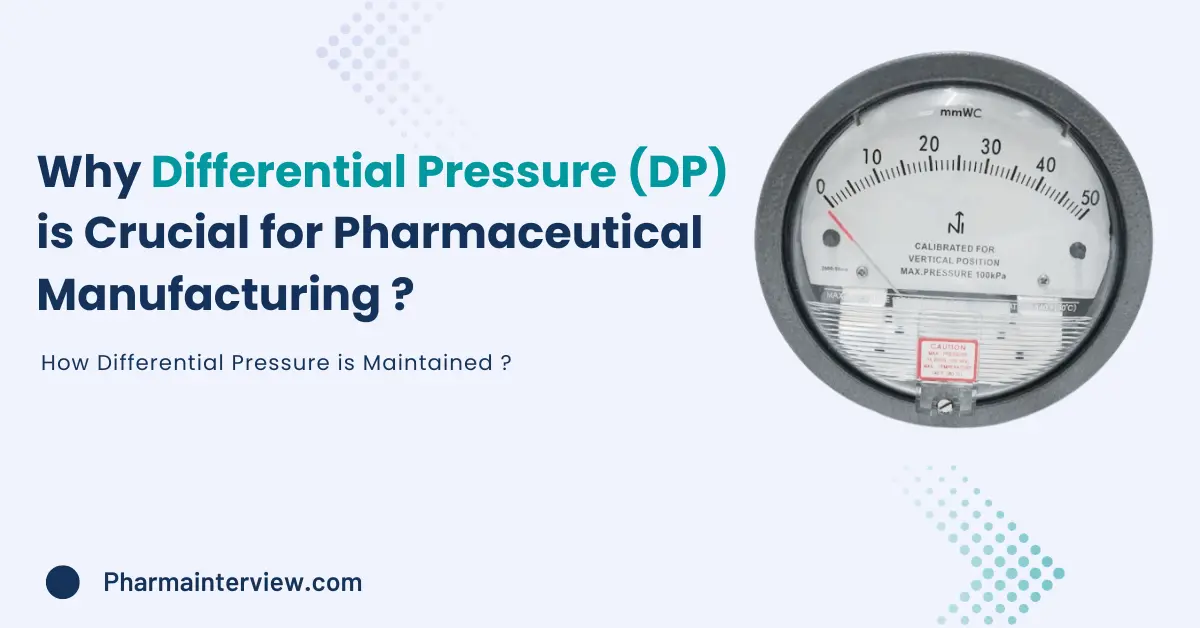Differential pressure (DP), Differential Pressure Unit, Prevent Cross-Contamination, pharmaceutical industry, sterile clean room, production, microbiology, sterile processing areas, pharmaceutical products, regulatory guidelines, Good Manufacturing Practices (GMP), Good Laboratory Practices (GLP), HVAC systems.

Why Differential Pressure is Crucial for Pharmaceutical Manufacturing
Differential pressure is the difference in air pressure between two locations within a system. It is an important tool for controlling contamination, product integrity, safety, and regulatory compliance in pharmaceutical manufacturing.
Contamination Control
Maintaining differential pressure helps to prevent the entry of contaminants, such as dust, bacteria, and viruses, into critical areas like cleanrooms and sterile processing areas. This is essential for ensuring the safety and efficacy of pharmaceutical products.
Product Integrity
Certain pharmaceutical manufacturing processes require specific pressure differentials to ensure the integrity of products. For example, differential pressure can be used to prevent cross-contamination between different drug formulations or to protect sensitive materials from exposure.
Safety
Differential pressure is also crucial for the safety of personnel working with hazardous materials. Negative pressure areas can contain airborne pathogens or volatile substances, and proper differential pressure control can help to minimize the risk of exposure.
Regulatory Compliance
Many pharmaceutical facilities must adhere to strict regulations and guidelines, such as Good Manufacturing Practices (GMP) and Good Laboratory Practices (GLP). Proper differential pressure control is often a regulatory requirement.
How Differential Pressure is Maintained in Pharmaceutical Manufacturing
Differential pressure is maintained between manufacturing and surrounding areas, and between different manufacturing areas, using HVAC systems. Positive pressure is typically maintained in cleanrooms and sterile processing areas, while negative pressure is maintained in areas where hazardous materials are handled.
How Differential Pressure Helps to Prevent Cross-Contamination in Tablet Production
In tablet production areas, pressure differential helps to prevent cross-contamination by preventing dust particles from entering the manufacturing process. This is important because dust particles can contaminate the tablets and make them unsafe for use.
Differential Pressure Unit: Millimeters of Water Column (mmWC)
The pressure unit, mmWC, stands for millimeters per water column. It is a unit of pressure that is commonly used in pharmaceutical manufacturing to measure differential pressure.
Positive pressure room Vs. Negative pressure room
Conclusion
Differential pressure is an essential tool for controlling contamination, product integrity, safety, and regulatory compliance in pharmaceutical manufacturing. By maintaining proper differential pressure, pharmaceutical companies can help to ensure the safety and efficacy of their products.
Join WhatsApp channel: Stay updated on pharmaceutical job opportunities, walk-in interviews, industry news, events, and pharma guidelines by joining our WhatsApp channel today.
FAQ on Differential Pressure in Pharmaceutical Manufacturing
What is differential pressure and why is it important in pharmaceutical manufacturing?
Differential pressure is the difference in air pressure between two locations within a system. It is important in pharmaceutical manufacturing because it helps to prevent contamination, protect product integrity, and ensure the safety of personnel.
How is differential pressure maintained in pharmaceutical manufacturing?
Differential pressure is maintained using HVAC systems. Positive pressure is typically maintained in cleanrooms and sterile processing areas, while negative pressure is maintained in areas where hazardous materials are handled.
How does differential pressure help to prevent cross-contamination in tablet production?
Differential pressure helps to prevent cross-contamination in tablet production by preventing dust particles from entering the manufacturing process. This is important because dust particles can contaminate the tablets and make them unsafe for use.
What is the unit of pressure used to measure differential pressure in pharmaceutical manufacturing?
The unit of pressure used to measure differential pressure in pharmaceutical manufacturing is millimeters of water column (mmWC).
What are the typical pressure differentials used in pharmaceutical manufacturing?
The typical pressure differentials used in pharmaceutical manufacturing vary depending on the specific application. However, a common range is 5 to 20 Pascals.
What are the regulatory requirements for differential pressure control in pharmaceutical manufacturing?
Many pharmaceutical facilities must adhere to strict regulations and guidelines, such as Good Manufacturing Practices (GMP) and Good Laboratory Practices (GLP). Proper differential pressure control is often a regulatory requirement.
What are the benefits of using differential pressure control in pharmaceutical manufacturing?
The benefits of using differential pressure control in pharmaceutical manufacturing include:
Improved contamination control, Enhanced product integrity, Increased safety for personnel and Improved regulatory compliance.